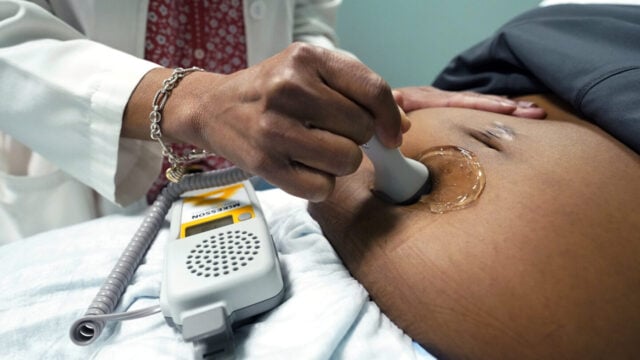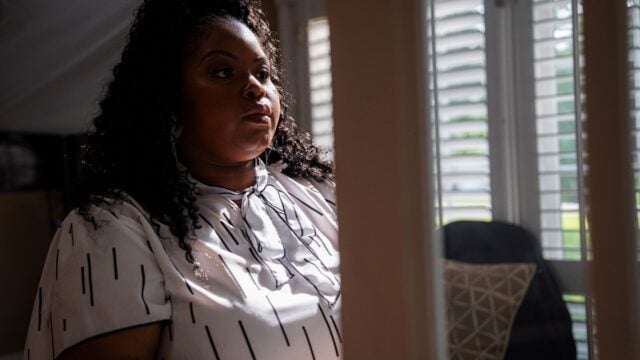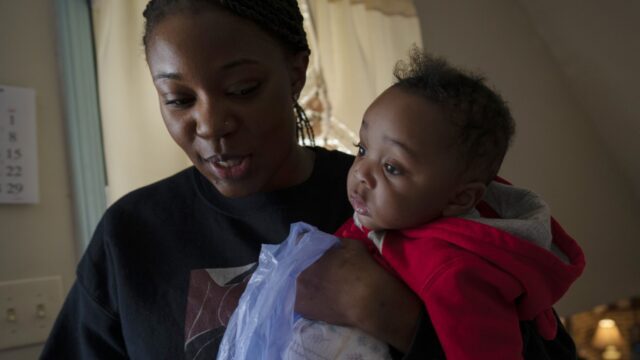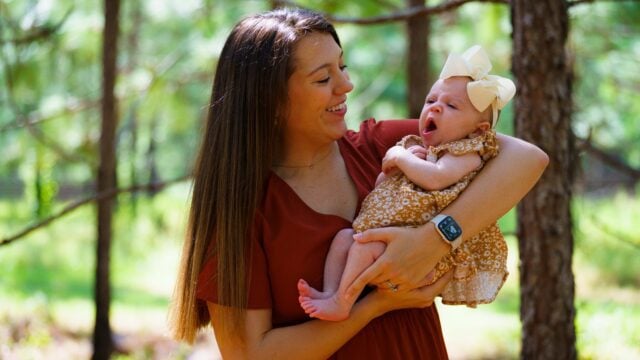A few years ago when she was pregnant with her first child, Katie Poole got high blood pressure.
“It’s very scary,” Poole said. “It was a little bit shocking to find out that there’s something potentially wrong with your pregnancy.”
She later developed preeclampsia, a condition that without treatment can damage the organs and the placenta and can up the risks for preterm birth and low fetal birthweight.
For the rest of that pregnancy, Poole, who is 32 and lives in Canton, Georgia, had to see her doctor much more often than she otherwise would have and keep an eye out for telltale warning signs, which can include swelling, vision problems, high levels of protein in the urine and persistent headaches.
“Because you don’t realize anything’s wrong until you have a bad headache and it can get really bad, really quick,” she said.
To keep Poole’s condition from worsening, doctors induced her labor three weeks early. Now, Poole is pregnant again and worries about controlling her blood pressure.
Georgia health advocates are trying to get the word out about the dangers of high blood pressure during and after pregnancy.
“High blood pressure is silent. It could put you in a lot of danger,” she said. “Sometimes you’ve got to speak up for yourself.” – Alpharetta resident Jacqueline Galvez, whose blood pressure has been elevated for most of her pregnancies
The state has one of the worst rates of maternal mortality in the nation, and high blood pressure and heart conditions are a leading cause of pregnancy-related deaths — 85% of which are deemed preventable, according to Georgia officials.
Treatment can be the difference between life and death.
On a weekend morning in Alpharetta a hotel conference space is decked out with balloons and wall banners for a maternal health and resources fair. The event has attracted a big crowd, mostly people who are pregnant or holding infants.
“We really want to try to make Georgia a safer place. And maternal mortality is what we’re here for today,” said Dr. Charles Wilmer, standing behind a folding display table wearing a white lab coat with his name embroidered on the chest.
He’s president of the Medical Association of Georgia and a cardiologist at Piedmont Heart Institute. But at the fair today, Wilmer is offering free blood pressure screenings.
“We want to try to educate people, encourage them to get their blood pressure checked, control their blood pressure. Get their weight under control,” he said. “So, if they get pregnant, we don’t see the damage that happens to the heart.”
Pregnancy-related high blood pressure, also known as hypertension, is on the rise. It affects up to 10% of pregnant patients, according to the CDC, and around a third of patients who died during a hospital delivery had a diagnosis of hypertensive disorders in pregnancy.
Hypertension can also pose a danger weeks after childbirth.
Wilmer opens a velcro blood pressure cuff with a glowing LED screen on its side, and attaches it to Poole’s upper arm.
“We’ll just wrap that,” he said. “And then you just relax and it’ll do the work.”
When it’s ready, Poole looks at the numbers on the screen.
“It’s a little bit elevated,” she said. “It’s typically 130s over 80s every day.”
For now, Wilmer recommends that Poole continue to keep an eye on her blood pressure. Any higher could indicate trouble. A reading of at least 140/90 mm Hg is how the American Heart Association defines stage 2 hypertension in pregnancy.
“At 140/90, I would treat that person,” Wilmer said, “and because the drugs are so good we can do that and patients do very well.”

At the entrance to the fair, Alpharetta resident Jacqueline Galvez cradles her 7-month-old baby boy in a sling across her chest. He’s sound asleep with his head on her shoulder.
Galvez has five children and says her blood pressure has been elevated for most of her pregnancies.
“In pregnancy, they did tell you you could start seeing spots and things like that. But I felt perfect. I didn’t feel anything. It wasn’t until you go to your prenatal appointments. They told me, ‘Your blood pressure is high — very high,’” she said. So, I had to start getting on medication, monitoring a lot. It was tough.”
Galvez has also had preeclampsia during every pregnancy, beginning with her third child.
“The first time I had preeclampsia, I don’t think I was as nervous as I should have been, maybe I was a little bit naive to think, it’ll be fine, I’m in the hospital, everything’s OK. But after you research, a lot of women have a lot of issues with preeclampsia,” she said. “So, after my first episode of preeclampsia, I did watch it a little closer.”
Galvez, 35, continues to take medication and monitor her blood pressure at home, just to be safe. She urges anyone who’s pregnant or postpartum to do the same thing even if they feel fine and don’t notice any symptoms. And to talk to their doctor.
“High blood pressure is silent. It could put you in a lot of danger,” she said. “Sometimes you’ve got to speak up for yourself.”
Public health officials agree that pregnant and postpartum patients need to advocate for themselves. And healthcare providers need to listen.
Along with timely health care and support, doing so could prevent complications and save lives.



















